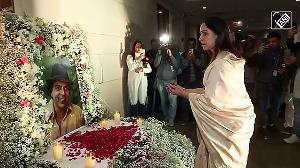'Karpoori Thakur must be remembered by people today who are tired of witnessing fractious politics where corruption, bigotry, hatred and violence seems to have become distressingly recurrent,' says Mohammad Sajjad.
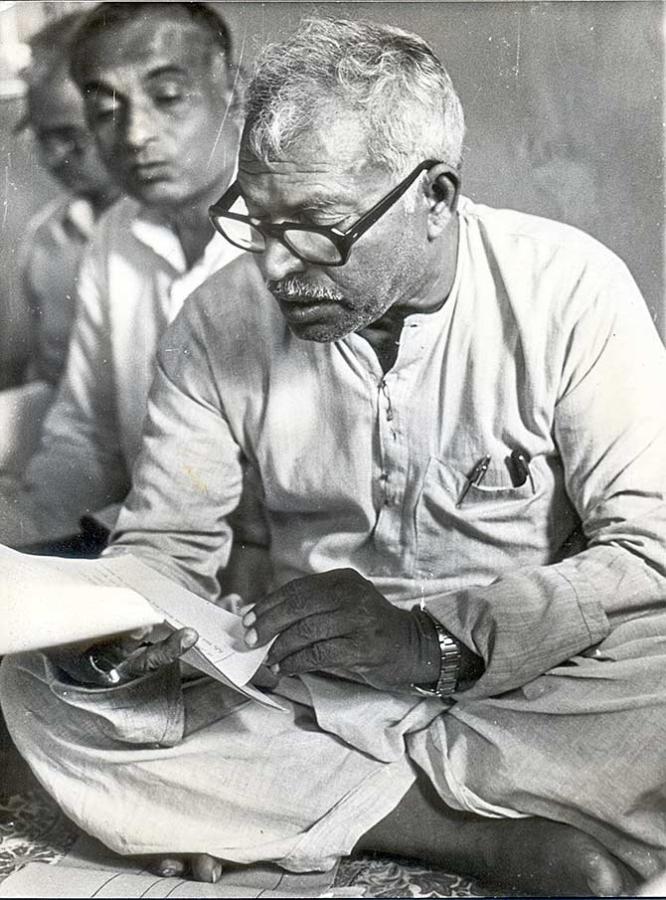
On January 24 falls the birth anniversary of Karpoori Thakur, a tall Socialist leader and freedom fighter, who was twice chief minister of Bihar and prior to that, the state's education minister and deputy chief minister.
Besides his successful efforts towards empowering the weaker sections, his interventions in legislative business are quite impressive.
Two thick volumes of his legislative interventions and debates were published in 2003. This possibly could be a rare feat that his role as Leader of the Opposition was recorded and analysed in a book. This should be instructive for some of the taller legislators of our days whose attendance remains pathetically poor in the Houses.
Thakur's consistent anti-Congressism, empowerment of the backward castes and removal of English as a compulsory language in high school examinations (thereby, enabling Hindi-speaking rural students for mobility towards higher education) are some of the most significant steps for which he must be remembered. This enabling exercise was condescendingly referred to as 'Karpoori Division'.
Despite being a leader of Socialist conviction, his pragmatism in striking alliances with ideological rivals such as the Bharatiya Jana Sangh, yet, empowering the religio-linguistic minorities is another equally significant step.
In his cabinet (1977-1979), the most important portfolios of education and health were held by Muslims: Ghulam Sarwar (1926-2004), and Professor Jabir Husain, respectively. Not only this, these ministers were granted enough space to implement their vision and programmes. Urdu was made a vehicle for employment in government offices and schools.
Karpoori Thakur challenged the upper caste hegemony in politics and education, even though he did not belong to a caste of numerical preponderance.
Contrary to certain dubious stereotypes against Bihar, it must be made widely known that not many chief ministers in independent India had such high integrity in public office and frugality in lifestyle as Karpoori Thakur.
For this he earned the sobriquet of Jana-Nayak (people's leader).
Ironically, during the final years of his life, he was marginalised by those very social groups for whose upward mobility and empowerment he tirelessly worked.
After 1985, he was dubiously replaced by Anup Lal Yadav, as leader of the Opposition. Lalu Yadav is said to have developed an aversion to him, condescendingly referring to him as 'Kapati' (wily as a fox) Thakur'.
Karpoori Thakur must be remembered by people today who are tired of witnessing fractious politics where corruption, bigotry, hatred and violence seems to have become distressingly recurrent.
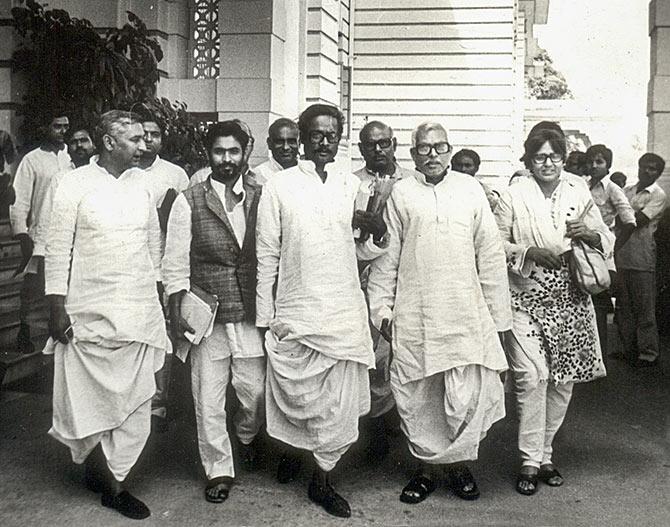
Karpoori Thakur was born in a poor family of barbers at a village, Pitaunjhia (now named after him as Karpoori Gram) near Samastipur, and very close to the village Waini, from where the violent revolutionary Khudiram Bose was arrested in 1908, to be hanged in Muzaffarpur jail.
Acharya Narendra Dev's visit to Waini in 1938 to address a peasant rally propelled Karpoori to join the freedom movement and Socialist politics in his youth.
The caste of barbers (Hajjam/Nai) are estimated to be less than two per cent of Bihar's population. Yet, in Bihar, where electoral politics testifies to deeply entrenched caste-based loyalties, mobilisation and polarisation, he never lost any assembly election after he won it for the first time in the first such election in 1952. (The only election he lost was in 1984 in the Lok Sabha election, which was held soon after Indira Gandhi's assassination, hence, a huge sympathy wave for the Congress.)
In 1967, when he was minister for education as well as deputy chief minister, he abolished English language being compulsory for school students. It courted intense controversies, but the deprived segments were enabled to move up.
He further made it mandatory for Christian missionary schools to teach Hindi. Making education more accessible, he did away with the fee for children from a weaker economic background.
The movement for making Urdu a second official language got a great boost and encouragement from Karpoori Thakur.
Between December 1970 to June 1971, when he was chief minister for the first time, he took some pro-subaltern steps in his brief tenure such as remission of revenue on less fertile-uncultivated lands.
He is said to have made it a point not to miss solemnisation of any inter-caste marriage. His efforts for poor and low caste people mounted enough pressure on the subsequent Congress government (1971-77) to institute the Mungeri Lal Commission.
In late June 1977, Karpoori Thakur became chief minister a second time. Immediately, he implemented the Mungerilal Lal Commission's recommendations. It provided for reservations (protective discrimination) for the backward castes in recruitments to public employment and enrolments in government educational institutions.
More importantly, it split the backward castes in two blocs, so that the upper Shudras (Yadavas, Koeris, Kurmis) should not take away the cake of the lower Shudras. This became popular as the 'Karpoori Formula'.
He also implemented three per cent reservations for women and another three per cent for the poor segments of upper castes which was struck down by the judiciary.
Besides, he also conducted Panchayati Raj elections in 1978, to reconfigure the upper caste hegemony in the rural power structure. The next Panchayati Raj elections were held in Bihar only in 2001, that too after a protracted judicial battle against the reluctant Congress and Lalu Yadav-Rabri Devi regimes.
In Karpoori Thakur's final days as chief minister, there was communal violence in Jamshedpur in April 1979. A few hours before quitting office, he instituted a three member enquiry under Justice Jitendra Narayan.
Thakur was in alliance with the Jan Sangh (with its 68 MLAs) whose leader Dinanath Pandey, an MLA from Jamshedpur, was in the state cabinet. The report, which came out in October 1981, indicted Pandey in no uncertain terms for his involvement in the violence. Atal Bihari Vajpayee -- who headed the Bharatiya Janata Party, the Jan Sangh's progeny -- suspended Pandey from the party.
Throughout the 1980s, the Congress ruled Bihar. Congress rule saw even worse communal violence -- in Biharsharif (May 1981), and in Bhagalpur (October 1989) -- which was unprecedented in its ferocity and barbarity.
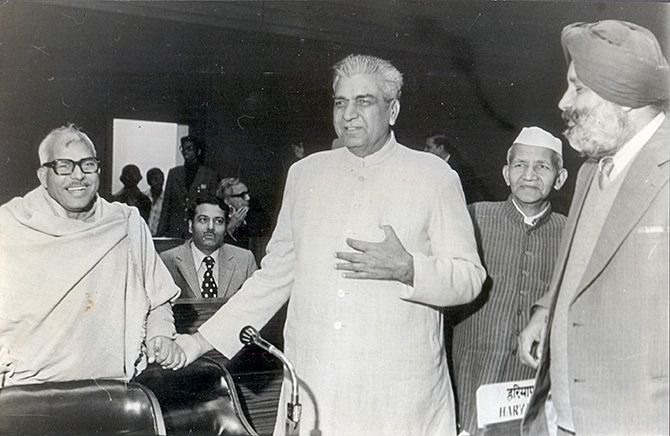
Today, when Rashtriya Janata Dal leader Tejaswi Yadav is trying hard to re-build a social coalition of lower castes and Dalits, mobilising them against the BJP's politics of providing 10% reservations for economically weak upper castes, one feels tempted to re-visit the legacy of Karpoori Thakur.
It becomes even more interesting as the BJP's ally, Nitish Kumar of the Janata Dal-United, has also been trying to reclaim Karpoori Thakur's legacy.
While a Socialist-Saffron alliance has been a regular affair in Indian politics since Independence -- Karpoori Thakur -- was not averse to it, it is pertinent to note that he pursued a wise politics of astute pragmatism, Paul Brass points out in his well researched 1976 essay.
Between 1965 and 1972, the Socialists in Bihar were divided in two factions. One, led by Bhola Prasad Singh, advocated an alliance with the Jana Sangh, the other led by Ramanand Tiwary (1909-1980; father of RJD leader Shivanand Tiwary). Kapoori Thakur did not identify with either Socialist group.
This strategy, according to Paul Brass, helped Kapoori Thakur rise. This was helpful for Thakur because in the anti-Congress, Socialist campaign for backward caste empowerment, Socialist leaders from an upper caste background could not have succeeded.
Such was the success of Socialist politics between 1965 and 1972 that even the Congress had to prop up a number of backward and Dalits as its chief ministers in Bihar.
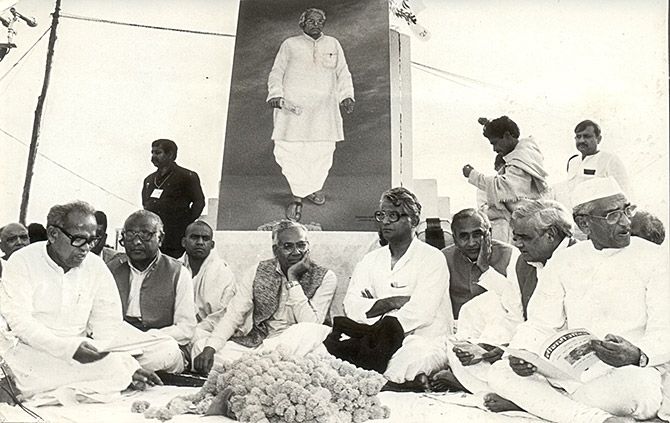
Karpoori Thakur's popular politics, on the streets, to mobilise the common people, during the 1960s and the 1970s is a relatively lesser known aspect particularly to today's youth.
Thakur became deputy chief minister on March 5, 1967 and remained in office till January 31, 1968. This 'accomplishment' was preceded by massive initiative and intervention by Thakur. For instance, in 1965, he led a powerful mass movement against the Congress's repressive anti-student regime so much so that the Congress had to take recourse to violent suppression of the popular agitations.
Thakur also protested to ensure job security for Tatas employees in Jamshedpur. He went on a fast unto death for 28 days. The Tata management had to yield and eventually conceded the workers's demands.
Similar dramatic mobilisations of workers, teachers, engineers, journalists, etc were undertaken in 1974. Thakur appealed to the Opposition, intelligentsia, students and youth to declare a jihad against Congress misrule. His pro-people performance as deputy chief minister in 1967 and as chief minister in 1970-1971, helped him connect with the people.
His slogan, 'Poora rashan, poora kaam, nahin to hoga chakka jam' caught the popular imagination. He went to the extent of proposing to arm poor peasants against violent subjugation by the landed elites of upper and intermediate castes.
Compare it with the performance of Mayawati, Akhilesh Yadav and Tejaswi Yadav!
They have hardly been able to launch such popular mass agitational movements against the incumbent regime. For instance, despite Muslims being their tremendous unflinching support-base, they did not hit the streets on the issue of lynching.
According to Jagpal Singh (Economic and Political Weekly, 2015), Karpoori, in the final phase of political career (1980 to 1988), was in search of a popular base among the lower OBCs, Dalits and the poor, struggling after being marginalised by the dominant OBCs.
So much so that he once aired his anguish, saying, 'I would not have faced such humiliation if I were born a Yadav'. During this period, he attempted to mobilise the Hindu community of fishermen (Mallah/Kaivartas/Nishads/Sahnis), listed as Ati Pichhrha (Most Backward). He addressed their rallies on June 19, 1983 and also on February 14, 1988, just three days before his death.
This could possibly be why Tejaswi and Akhilesh may not like to emulate his politics.
Despite massive suffering (of the poor and lower middle classes) owing to demonetisation, (and of the petty bourgeoisie) owing to GST, the messiahs of social justice -- Akhilesh, Tejaswi and also Mayawati -- kept themselves almost confined within the comfort zones.
Without such street politics, they are now trying to join hands together. Such coalitions may help them in forthcoming elections, but that certainly exposes the limits of their leadership.
Such lethargy and deficit in conviction and action will not help the masses as much as they really need in the face of palpable socio-economic inequalities at the moment.
Rural distress and mounting youth unemployment, in the face of aggressive crony capitalism, with their dangerous control on the media, need leadership which could mobilise the suffering segments, removing their fear of State repression/
The toiling masses need to be brought out on the streets with catching slogans. Karpoori Thakur's legacies need to be reclaimed. Only then can a stronger and robust Republic really be made.
Precisely, there lies the significance of remembering Karpoori Thakur!
Mohammad Sajjad -- professor of history at the Centre of Advanced Study in History, Aligarh Muslim University -- is the author of Muslim Politics in Bihar: Changing Contours and Contesting Colonialism and Separatism: Muslims of Muzaffarpur since 1857.










